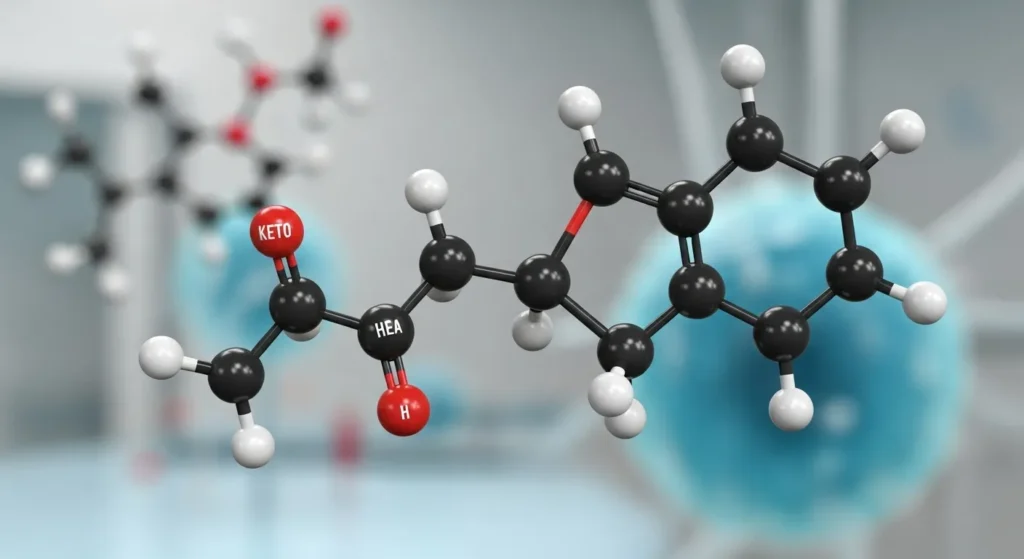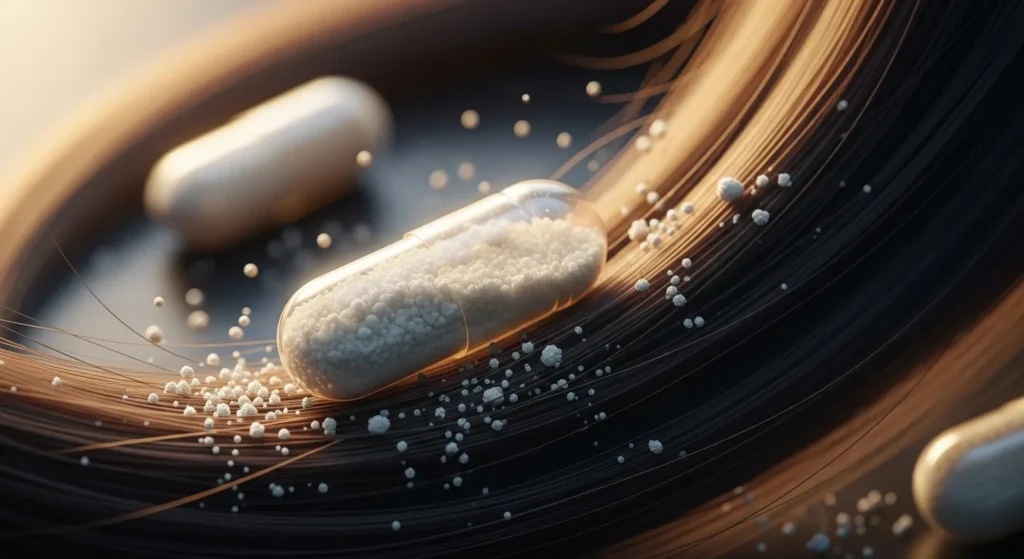Worried that your Does 7-Keto DHEA Cause Hair Loss? You’re not alone. This popular fat-burning compound is often used for weight loss and energy, but some users report unexpected side effects like thinning hair.
In this article, we explore whether 7-keto DHEA causes hair loss, how it differs from regular DHEA, and what to do if you’re noticing shedding. You’ll get clear answers, expert-backed advice, and safer alternatives to support both your body and your hair.
What Is 7-Keto DHEA?

How It Differs from Regular DHEA
7-keto DHEA is a metabolite of dehydroepiandrosterone (DHEA), a hormone naturally produced by the adrenal glands. While DHEA can convert into testosterone or estrogen in the body, 7-keto DHEA does not convert into sex hormones, making it a preferred option for those seeking fat loss benefits without hormonal side effects.
Common Uses and Benefits
- Supports weight loss by increasing thermogenesis.
- May improve immune function and energy levels.
- Often used in anti-aging and body recomposition supplements.
Mechanism of Action in the Body
7-keto works by enhancing basal metabolic rate (BMR) and stimulating certain enzymes related to fat metabolism. It’s promoted as a non-hormonal supplement, but some of its effects still indirectly impact hormone-sensitive functions, like hair growth.
Can 7-Keto DHEA Cause Hair Loss?
Hormonal Effects and Hair Cycle Disruption
Even though 7-keto DHEA doesn’t convert to estrogen or testosterone, it still influences the endocrine system. Changes in cortisol levels, metabolic rate, or indirect DHT (dihydrotestosterone) signaling may disrupt the hair growth cycle, especially in individuals prone to androgenic alopecia (pattern hair loss).
Estrogen, Testosterone, and DHT Implications
- DHT is the primary hormone involved in male and female pattern baldness.
- While 7-keto isn’t directly converted to DHT, its systemic metabolic activity may influence other hormonal pathways.
- Some individuals might experience an increase in androgen sensitivity, contributing to shedding.
What Current Research Says
No direct clinical studies have proven that 7-keto DHEA causes hair loss. However, research on its parent compound (DHEA) shows possible links to hair thinning due to its androgenic activity. Anecdotal reports and expert opinions suggest caution, especially in genetically predisposed individuals.
User-Reported Experiences and Anecdotal Evidence
Many online forums, including Reddit and hair loss communities, feature personal stories of users noticing increased shedding after starting 7-keto DHEA. These are not scientific proof but real-world signals worth paying attention to.
7-Keto DHEA vs DHEA: Which Is Worse for Hair?
Differences in Hormonal Conversion
- DHEA is converted to testosterone and estrogen, both of which can indirectly increase DHT levels.
- 7-keto DHEA, on the other hand, does not convert to these hormones, theoretically reducing risk.
DHT Elevation Potential
Regular DHEA has a higher likelihood of raising DHT, increasing the risk of hair loss. 7-keto DHEA may still pose a risk via indirect pathways, but less so than traditional DHEA.
Comparative Side Effect Profiles
- DHEA: Higher risk of acne, mood swings, and hair loss.
- 7-keto DHEA: More commonly linked to insomnia, irritability, and occasional shedding in sensitive users.
Bottom Line: If you’re concerned about hair health, 7-keto may be safer than DHEA, but it’s not entirely risk-free.
Who’s Most at Risk of Hair Loss While Using 7-Keto DHEA?
Genetic Predisposition to Androgenic Alopecia
If male or female pattern baldness runs in your family, your hair follicles may be hypersensitive to hormonal changes, making you more vulnerable.
Pre-existing Hormonal Imbalances
People with thyroid issues, PCOS, or adrenal fatigue may react differently to supplements that influence metabolism and cortisol levels.
Women vs Men: Hormonal Sensitivity Differences
- Women may be more sensitive to even small hormonal shifts, particularly post-menopause.
- Men with high baseline DHT may notice faster hair miniaturization when on hormone-related supplements.
What to Do If You Notice Hair Loss After Taking 7-Keto DHEA
Stop or Reduce Dosage
Discontinue or reduce your dose and observe changes over 4–6 weeks. Hair often enters a shedding phase and takes time to rebalance.
Talk to Your Healthcare Provider
A blood test to check hormone levels—DHEA-S, testosterone, estradiol, and cortisol—can provide insight.
[Medical Reviewer Note Needed Here]
Hormonal Blood Tests to Consider
- Total Testosterone
- Free Testosterone
- DHT (Dihydrotestosterone)
- Estradiol (E2)
- Cortisol (AM)
- Thyroid panel (TSH, Free T3, Free T4)
Safe Alternatives for Weight Loss or Energy
- L-carnitine
- Rhodiola Rosea (an adaptogen)
- Green tea extract
- Ashwagandha (stress and cortisol balancing)
Studies Linking DHEA Variants with Hair Shedding
While direct studies on 7-keto and hair loss are sparse, studies on DHEA supplementation show increased androgen activity, especially in females with PCOS. This may lead to hair thinning over time.
What Integrative Medicine Says
Functional medicine practitioners often advise cycle usage and pairing DHEA variants with adaptogens to minimize side effects.
Other Side Effects of 7-Keto DHEA to Be Aware Of
Sleep Disturbances
Because 7-keto can increase cortisol, some users report insomnia or vivid dreams.
Mood Changes
Irritability, anxiety, or racing thoughts may occur in individuals sensitive to adrenal stimulation.
Skin or Acne Issues
While less likely than with DHEA, some users develop breakouts or oily skin, especially with higher doses.
Safer Supplements That Don’t Affect Hair
Natural Metabolism Boosters
- Green coffee bean extract
- CLA (conjugated linoleic acid)
- Fiber supplements (for appetite control)
Adaptogens and Nootropics
- Lion’s Mane mushroom (focus and energy)
- Rhodiola (stress and metabolism)
Hair-Friendly Alternatives
- Biotin
- Saw Palmetto (DHT blocker)
- Marine collagen (follicle support)

FAQs About 7-Keto DHEA and Hair Loss
Can 7-keto DHEA cause permanent hair loss?
Not usually. Hair loss is often reversible after discontinuing the supplement, though results may vary based on genetics.
How long before hair grows back after stopping it?
You may notice improvement within 8–12 weeks, depending on your hair cycle and overall health.
Is it safe to combine 7-keto DHEA with hair loss treatments?
Consult a doctor first. Some combinations, like with minoxidil or finasteride, are possible but require monitoring.
Is topical DHEA better for hair health?
Topical versions still carry risk, especially when applied to areas with high androgen receptor sensitivity.
Concerned About Hair Loss? Get Expert Help
If you’re experiencing unexplained hair shedding while taking 7-keto DHEA, don’t guess—get expert advice.
Book a consultation with Dr. Rana Irfan, a leading hair restoration specialist in Islamabad, to evaluate your condition and discuss personalized treatment options like PRP, stem cell therapy, or FUE hair transplant.
Let’s protect your hair—and your health—together.
